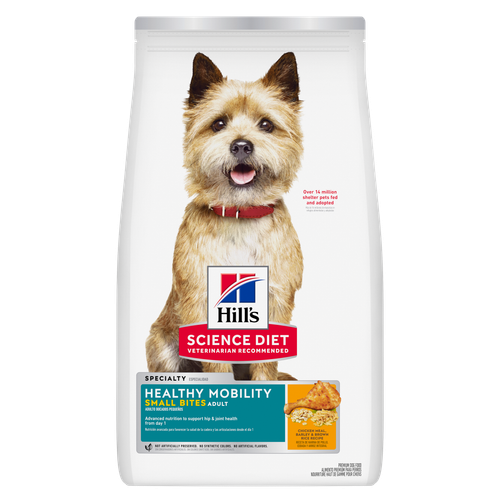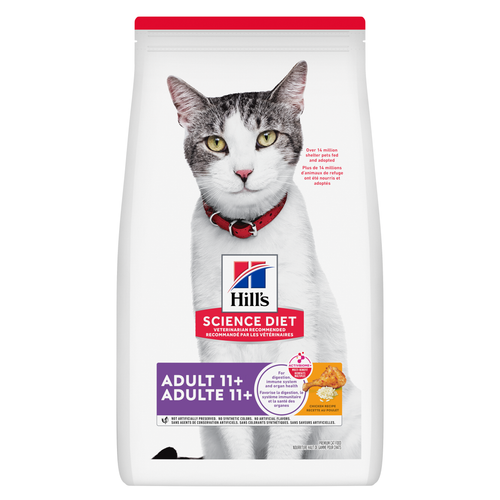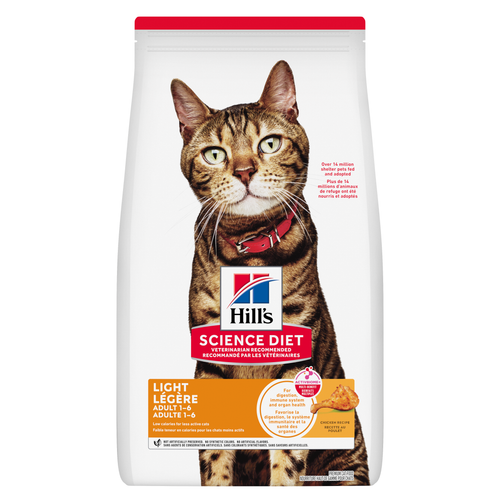
-
Find the right food for your petTake this quiz to see which food may be the best for your furry friend.Find the right food for your petTake this quiz to see which food may be the best for your furry friend.Featured products
 Adult Healthy Mobility Small Bites Chicken Meal, Barley & Brown Rice Recipe Dog Food
Adult Healthy Mobility Small Bites Chicken Meal, Barley & Brown Rice Recipe Dog FoodAdvanced nutrition to support hip & joint health from day 1
Shop Now Adult Sensitive Stomach & Skin Small & Mini Chicken Recipe Dog Food
Adult Sensitive Stomach & Skin Small & Mini Chicken Recipe Dog FoodHill's Science Diet Sensitive Stomach & Skin Small & Mini dry dog food is tailored nutrition for Small & Mini dogs while being gentle on stomachs. Nourishes skin & promotes a lustrous coat.
Shop Now Adult Light Large Breed Chicken Meal & Barley Recipe Dog Food
Adult Light Large Breed Chicken Meal & Barley Recipe Dog Food18% lower calories vs. Science Diet Large Breed Adult
Shop NowFeatured products Adult 11+ Chicken Recipe Cat Food
Adult 11+ Chicken Recipe Cat FoodSupports brain health & beautiful fur. Helps keep immune system, heart & kidneys healthy.
Shop Now Adult Light Chicken Recipe Cat Food
Adult Light Chicken Recipe Cat Food20% lower calories vs. Hill's Science Diet Adult
Shop Now Adult Healthy Cuisine Seared Tuna & Carrot Medley Cat Food
Adult Healthy Cuisine Seared Tuna & Carrot Medley Cat FoodDelicious seared tuna paired with tender carrots in a mouthwatering sauce
Shop Now -
Dog
- Dog Tips & Articles
-
Health Category
- Weight
- Food & Environmental Sensitivities
- Urinary
- Digestive
- Joint
- Kidney
- Dental
- Cancer
-
Life Stage
- Puppy Nutrition
- Adult Nutrition
- Senior Nutrition
Cat- Cat Tips & Articles
-
Health Category
- Weight
- Skin & Food Sensitivities
- Urinary
- Digestive
- Kidney
- Dental
- Stress
- Cancer
-
Life Stage
- Kitten Nutrition
- Adult Nutrition
Featured articles Water
WaterDiscover why water is the most important nutrient for your dog or cat to live a healthy life. Find out how much water your pet should consume each day.
Read More Antioxidants
AntioxidantsUnderstand the importance of antioxidants in your dog or cat's food, and how they can help protect your pet and keep them healthy.
Read More Importance of DHA in your Pet's Food
Importance of DHA in your Pet's FoodLearn about DHA, Docosahexaenoic Acid, a natural omega-3 fatty acid that is essential in the development of the brain and nervous system in cats & dogs.
Read More -


Do cats fart? Although not necessarily the best topic for the dinner table, cat farts are an important topic for pet parents to learn about.
Like other gastrointestinal functions, flatulence is a natural occurrence in animals. Though not as often (or as loudly) as dogs and humans, the dignified cat does, indeed, pass gas.
Why Do Cats Fart?
Flatulence typically results from a buildup of gas in the digestive system, which is then released from the body. In most instances, cat flatulence occurs when your kitty swallows too much air, or it could be related to allergies or food.
Allergies to dust, pollen and pests such as ticks and fleas can also cause digestive distress, including vomiting, flatulence, or diarrhea. Flea allergies are quite common, says the Cat Hospital, but if these symptoms are profuse, you should check with your veterinarian before administering any treatment.

Food allergies or sensitivities can contribute to excessive gas, too. In fact, food is considered one of the main causes of cat farts. In its nutritional guidelines, the World Small Animal Veterinary Association (WSAVA) includes flatulence as an "altered gastrointestinal function" in its global "Nutritional Screening Risk Factor" checklist for veterinarian nutritional assessment. WSAVA's nutritional assessment accounts "for snacks, treats, table food, foods used for medication administration, and dietary supplements" — basically, anything your kitty puts in their tummy.


Tasty Tips
Food and Cat Farts
Choosing the right cat food for your feline friend is a great first step for managing their flatulence. Select a meal plan that includes the necessary vitamins and minerals and fits their size, age and activity level. Fiber, for example, is great for a cat's digestive system, but too much fiber can cause excessive gas. In certain cases, your veterinarian may recommend a therapeutic cat food like Hill's® Prescription Diet® that is specially formulated for proper feline digestion.
Also, cat farts are just one reason that you generally shouldn't give your cat people food. There are some foods, including some fruits, that are safe for cats in moderation, according to the Association of American Feed Control Officials (AAFCO). But consider how an excess of fiber can affect you. Now, think about that happening to your cat. Not good, right?
Though your cat can tolerate some people food, it's best to stick to food that's formulated for your furry friend, as emphasized by AAFCO: "Sharing food from the family table with pets can introduce a nutrition imbalance because pet foods typically offer an entire complete and balanced diet in a single product. In fact, many food items that humans eat are toxic to cats and dogs."
Always contact your vet before feeding people food to your kitty to ensure that it's safe for you to do so.
Flatulence and Health Issues
In rare cases, cat flatulence may be caused by a serious illness such as Tritrichomonasfoetus, an intestinal parasite that can produce gassy, "malodorous" feces, says the North Carolina State College of Veterinary Medicine. If your cat shows other signs of gastrointestinal distress, including excessive diarrhea and vomiting, and their gas has a strong smell, take them to the vet right away so a doctor can check for an underlying health issue.
Rest assured, most cat farts are not a cause for concern. They won't pass gas frequently, and when they do, they'll probably be just as surprised as you are. Cats are elegant creatures; you won't always hear it or smell it, as most gas is odorless — dainty and delicate, just like your cat.
Most of the time, a toot is just a toot. However, if you have any concerns, be sure to talk to your vet. He or she can also make recommendations on a quality food for your cat to ensure that you are properly feeding their digestive health.


One of our staff authors prepared this article for you
Related products

Delicious seared tuna paired with tender carrots in a mouthwatering sauce

Supports brain health & beautiful fur. Helps keep immune system, heart & kidneys healthy.

20% lower calories vs. Hill's Science Diet Adult

With delicious chunks in a decadent gravy
Related articles

Cats are naturally very clean and chances are your kitten will already have learned how to use the litter box from her mother before she comes to live with you.

Discover how to train your cat, starting with very basic first steps that both reward good behavior and discourage the bad.

When you adopt a cat, you don't just gain a best friend; you also save her life. Here's why getting a cat from a local animal shelter makes so much sense.

Discover the benefits of Hill's line of kitten foods and how they provide complete and balance nutrition for growing kittens.

Put your cat on a diet without them knowing
Our low calorie formula helps you control your cat's weight. It's packed with high-quality protein for building lean muscles, and made with purposeful ingredients for a flavorful, nutritious meal. Clinically proven antioxidants, Vitamin C+E, help promote a healthy immune system.
Put your cat on a diet without them knowing
Our low calorie formula helps you control your cat's weight. It's packed with high-quality protein for building lean muscles, and made with purposeful ingredients for a flavorful, nutritious meal. Clinically proven antioxidants, Vitamin C+E, help promote a healthy immune system.

